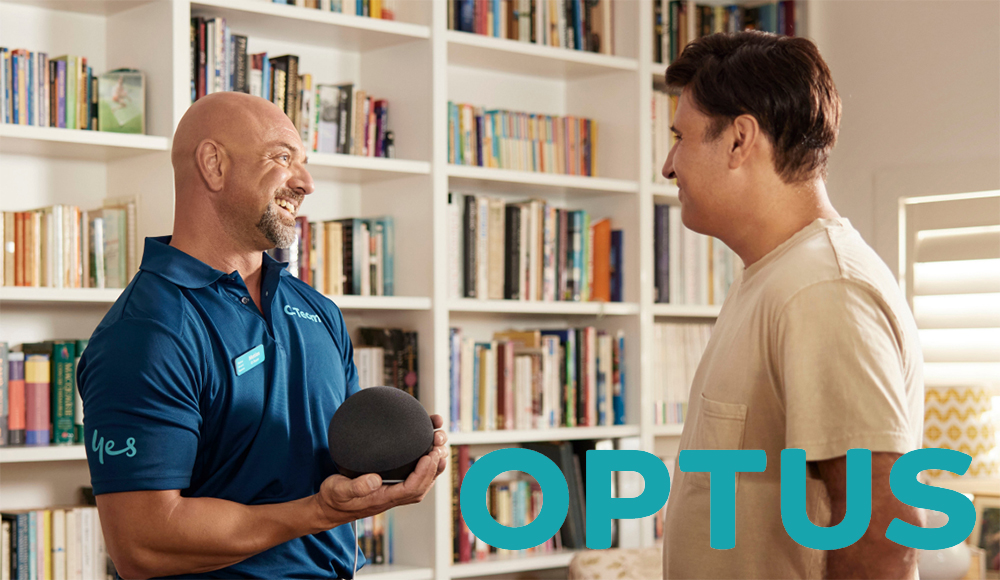Key Dates
Next Grant Round:
Applications for funding will open early 2025.
> Information about our Grants Program
Independent Grants Panel:
Results of the recent EOI will be notified Dec 2024.
> Information about our Panel
We can help: grants@accan.org.au
or phone 02 9288 4000
Subscribe to Grants Program mailings
 Download:
Download: ![]() Hidden costs in free apps 57.5 KB
Hidden costs in free apps 57.5 KB
Download: ![]() Hidden costs in free apps 334.2 KB
Hidden costs in free apps 334.2 KB
While some games or apps cost nothing to download on our smartphones or tablets, they often contain extra elements you can purchase within the game, known as “in-app purchases.” It is easy to make in-app purchases with many parents reporting that their children are buying things within games, not realising that they cost their parents real money through their iTunes, Google Play or Amazon account.
Read more: Hidden costs in free apps
Write comment (0 Comments)ACCAN's engagement with rural, regional and remote consumers has continually highlighted the importance of improving mobile communications outside of urban centres. Better mobile coverage will yield a range of benefits to regional and remote Australia including improved business opportunities, better access to essential services and enhanced safety and well-being.

Download: ![]() How to avoid directory assistance call charges64.5 KB
How to avoid directory assistance call charges64.5 KB
Download: ![]() How to avoid directory assistance call charges443.87 KB
How to avoid directory assistance call charges443.87 KB
Did you know that calls to Directory Assistance 1223 and other directory phone numbers may not be free of charge from your mobile or landline phone? Sometimes these calls are charged outside of your included plan value, so you may receive extra charges on your bill from calling these numbers.
Whenever possible, you should avoid calling directory assistance numbers and instead use one of the alternatives listed below.
Read more: How to avoid directory assistance call charges
Write comment (0 Comments)As a customer you will deal mainly with your retailer service provider.
Below is a list of steps that you might take, who to contact, and what might happen.
| Issue | Who to contact | Details |
|
Check eligibility for service |
nbn / retail service provider |
nbn website allows you to check if you are eligible for services. Retail service providers will also be able to advise if you are eligible for services |
|
Purchase a service |
Retail service provider |
Retail service providers sell plans to consumers and small businesses. They will also organise for an nbn technician to connect your premises |
|
Get connected |
Retail service provider |
After purchasing a service with a retail service provider they will arrange for equipment to be installed at your premises. |
|
Delay in getting connected |
Retail service provider |
If the technician missed an appointment or connection is taking longer than expected contact your retail service provider. |
|
Property damage during installation |
nbn |
If the nbn technician caused damage to your property during installation you should contact nbn, who will repair this damage at no charge. |
|
Service does not work after installation |
Retail service provider |
If your service does not work after nbn have installed the equipment contact your retail service provider |
|
Complaint of faulty services |
Retail service provider |
If there are any problems with your connection, such as unusable services, dropouts, delays, slow speeds etc., you should raise the issue with your retail service provider. |
|
Query bill charges |
Retail service provider |
If you experience any unexpected charges you should raise these with your retail service provider. |
|
Service outage |
Retail service provider |
If your service stops working for any reason, contact your retail service provider. |
|
Disconnecting |
Retail service provider |
If you no longer want a Sky Muster service, contact your retail service provider to cancel. |
|
Moving services |
Retail service provider |
If you are moving house, contact your retail service provider about changing your service to different premises. Fees may apply to move a service. |
|
Damaged or moved equipment |
Retail service provider |
If the equipment gets damaged (for example during storms or an object hitting the satellite dish) contact your retail service provider. An nbn technician may be required to visit your premises to correct the position or replace the equipment. There may be a cost, check with your provider. |
|
Complaint about retail provider or nbn not addressing problems encountered |
Telecommunications Industry Ombudsman (TIO) |
If your complaint to your retail service provider or nbn has not been dealt with, contact the TIO. The TIO will refer your complaint to your provider or nbn and give them 10 days to fix your problem. If this does not solve your problem the TIO will work with you and the provider to see if you can agree on how to fix the problem. Finally, if the issue is still not resolved then the TIO can investigate your complaint. |
|
Changing retail service provider |
Retail service provider of choice |
Switching between retail service providers is easy with Sky Muster. Just make sure there are no early termination fees with your current retail service provider. |
|
Think you have seen a scam |
Scam Watch |
Internet scams may attempt to take your money, steal your identity, or access your personal information. If you think you have seen a scam contact Scam Watch. |
How to effectively complain and ensure your rights
- Outline your problem and the outcome that you want to your retail service provider. Ask for a response in a reasonable timeframe (e.g. two weeks). Make a note of all your dealings with your retail service provider for future reference.
- If your issue is not resolved contact the Telecommunications Industry Ombudsman
Where do I get more information?
Contact details:
- ACCC on: 1300 302 502
- Activ8me: 13 22 88
- ANT Communications: 1300 268 266
- BorderNet: 1300 730 302
- Clear Networks: 1300 855 215
- Harbour ISP: 1300 366 169
- IPSTAR: 1800 477827
- nbn: 1800 687 626
- Reach Net: 1800 687 626
- Sky Mesh: 1300 759 637
- TIO: 1800 062 058
Further consumer tips can be found on our website.
 |
Vince Humphries, Chairperson
Vince worked in communications regulation for over 30 years, most of that time with the Australian Communications and Media Authority (ACMA) and its predecessors. In his various roles, he dealt with most aspects of telecommunications regulation, together with regulation of online content, spam and telemarketing calls. In the area of telecommunications regulation, Vince led the ACMA’s efforts to drive a stronger emphasis on telco compliance with consumer safeguards, develop a range of consumer safeguards specific to the NBN, introduce publication of regular reports on complaints received by telcos and on how telcos deal with financial hardship, and a range of initiatives focusing on consumers in vulnerable circumstances. Vince lives in regional Victoria and has lived experience of some of the challenges in having reliable access to quality communications services in regional areas.
|
 |
Delia Rickard PSM, Deputy Chairperson
Delia has worked in consumer protection for 30 years, the last 10 or which were as the Deputy Chair of the ACCC. In that role she sat of the ACCC’s Communications and Enforcement committees, was a member of their Digital Platforms board as well as participating in multiple areas involving consumer protection. Her passions include stopping scams and creating a more equitable & sustainable society. She also previously worked senior roles at ASIC where one of her main focuses was financial capability. In 2011 she was awarded the Public Service Medal for ‘outstanding public service in the development of consumer protection for financial services’. She has also been awarded the SOCAP Lifetime Achievement award and in 2022 the Inaugural Australian Law Council’s Australian Consumer Rights award. Delia is currently involved with a range of not for profit organisations including the Australian Financial Complaints Authority; Super Consumers Australia; Good Shepherd’s financial inclusion action plans and the Jan Pentland foundation.
|
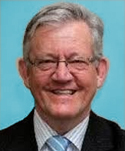 |
Keith Besgrove
Keith has extensive communications policy/regulatory qualifications after fifteen years as a senior manager in the Department of Communications (2000-2014). During that time, he was pivotal to ACCAN's establishment; to securing its initial funding; and in shepherding ACCAN through subsequent government, four-year reviews. Keith has a very wide range of experience of issues relevant to ACCAN. Aside from his work on consumer and disability issues, he developed Australia's first cyber security strategies; over sighted the creation of auDA; crafted legislation to combat spam and internet gambling; established the Do Not Call Register; helped adopt broadband in healthcare and education; managed spectrum sales; and reviewed the TIO. He was responsible for regional and indigenous communications issues for seven years including the second Regional Telecommunications Independent Review Committee, and managed installation of satellite phones and wi-fi points of presence in remote indigenous communities. Since leaving the Department in 2014, he has worked with many not-for-profit groups, including Financial Counseling Australia and spent 3 years as an advocate at Energy Consumers Australia. He is a Chair of the Funding Committee for Dragon Claw -- a web-based service for rheumatoid arthritis sufferers; a member of the board of an arts company, the CAD Factory; and a governing member of auDA. He is a vice-Chair of Internet Australia, and a member of the ACS’ Profession Advisory Board.
|
 |
Bobbie Blackson
Bobbie is a longstanding member of the Australian Deaf community and has been involved in various paid and non-paid capacities across disability/not-for-profit/government/tertiary sectors spanning 40 years. This has included being the Chair of Deaf Australia, the Chair of Deaf Connect, a member of the Australian Disability Advisory Council as well as a number of state and local organisations. She is a life member and Emeritus Chair of Deaf Connect. She was a co-founder of Deaflink which saw Australia’s first consumer-driven relay service eventually servicing all of Queensland. Deaflink merged with Deafness Resources Australia to form Australian Communication Exchange which provided the first National Relay Service. Bobbie has witnessed and supported deaf and hard of hearing people face the challenges of dealing with various traditional and interactive media platforms. Communication technology is potentially an enabler, but also poses many new barriers. Bobbie lives in rural SE Queensland and has experienced the challenges of adequate reliable communications services. Initially trained as a social worker, she has also gone on to be a Justice of the Peace (Qual), a civil marriage celebrant and is a member and Graduate of the Australian Institute of Company Directors. Bobbie has lived experience of challenges of navigating life as a deaf person in a hearing focussed, and now voice-activated world.
|
 |
Chris Dodds
Chris has been involved in the Community Service Industry for over 40 years in both a paid and volunteer capacity. This has included work as a childcare worker in a Women's Refuge, Coordinator at a Neighbourhood Centre and teaching at both TAFE and University. He served on the Board of NCOSS for 14 years including four year (2002-6) as President. He also served on the Board of ACOSS for eight years including five years on the Executive. Chris represents ACOSS on and is also Chairperson of Telstra's Low Income Measures Assessment Committee (LIMAC) which oversees $200 million of assistance provided by Telstra to low income customers each year.
|
 |
Daniel Featherstone
Daniel is a passionate advocate for equitable access to affordable and reliable communications services, with over 20 years of experience in media, communications, and digital inclusion, particularly in remote First Nations communities. Since 2021, Daniel has led the ‘Mapping the Digital Gap’ project at RMIT University, supporting the goal of First Nations digital equity by 2026. Daniel brings first-hand experience from regional Victoria and central Australia, where he managed Indigenous media organisations and initiated programs like inDigiMOB. A long-time supporter of ACCAN, Daniel contributes to policy submissions and advocacy efforts, and is eager to further support ACCAN’s mission on the Board.
|
 |
David Havyatt
David had a 35-year career in telecommunications that was structured in the reverse to many others. Post University he started as a clerk in old fashioned customer account teams, worked his way up to General Manager roles in Sales and Strategy, then morphed into a regulatory specialist before ending up in a Minister's office. Post his telco career he spent five years as Senior Economist at Energy Consumers Australia and after retiring spent the last three still focussed on energy consumer issues. He brings to ACCAN extensive governance and regulatory experience. His regulatory experience has been primarily in industry, though he was particularly focussed on roles improving consumer experience. He served on the Boards of CommsAlliance, AMTA and the TIO as well as being Chair of the Board of Endeavour Credit Union and the Glen Street Theatre. David prides himself on being a creative thinker who looks for the less obvious answers to “wicked” problems.
|
 |
Robert Morsillo Robert brings over four decades of expertise in not-for-profit governance and extensive experience in telecommunications and consumer advocacy. Robert’s diverse educational background, which includes a BSc, an MA in Communications, and a focus on community development and public policy, uniquely positions him to contribute to ACCAN’s mission. He brings 40 years of experience in governance roles across various organizations, including Infoxchange, 28 years at Telstra in consumer affairs and digital inclusion, and 15 years in community work. As a research fellow and PhD student at RMIT, specialising in digital social innovation, Robert is committed to fostering cross-sector collaboration to enhance communication access for vulnerable groups. Through his involvement with the ARC Centre of Excellence for Automated Decision-Making and Society, he aims to bring valuable insights into the social impacts of emerging technologies, ensuring ACCAN continues to advocate for those at risk of exclusion in our rapidly evolving digital landscape.
|
 |
David Spriggs David Spriggs is the CEO of Infoxchange, a not-for-profit social enterprise with the vision of ‘technology for social justice’. He is passionate about creating a more digitally inclusive society and the role technology can play in improving the efficiency and effectiveness of the not-for-profit sector. In addition to his role at Infoxchange, David is Chair of the Australian Digital Inclusion Alliance (ADIA) and Deputy Chair of Specialisterne Australia, working to create careers for people on the autism spectrum. David is also a Non-Executive Director of the Alannah & Madeline Foundation, a charity dedicated to keeping children and young people safe from violence wherever they live, learn and play. David holds a Bachelor of Information Technology from the University of Queensland, a Certificate in Theology from Trinity College at the University of Melbourne and is a Graduate of the Harvard Business School Executive Education Program and the Australian Institute of Company Directors. |
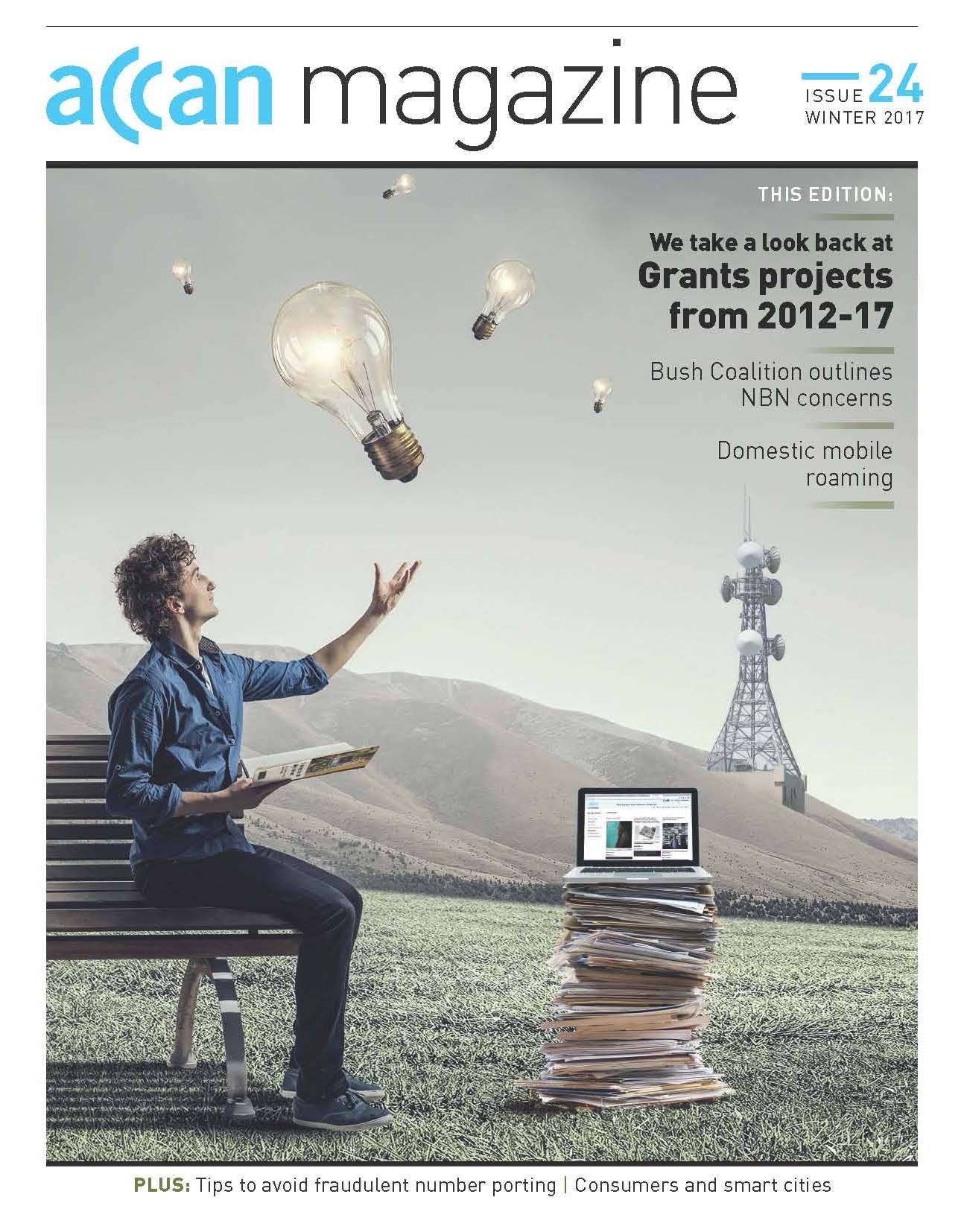
Download: ![]() ACCAN Magazine Issue 24 Winter 20173.71 MB (Note: reading order not accessible)
ACCAN Magazine Issue 24 Winter 20173.71 MB (Note: reading order not accessible)
Download accessible version: ![]() ACCAN Magazine Issue 24 Winter 2017 - accessible version39.76 KB
ACCAN Magazine Issue 24 Winter 2017 - accessible version39.76 KB
ACCAN believes that everyone must have equal, reliable and appropriate access to the emergency call service (Triple Zero) from a range of devices. Our position is that people should be able to use SIMless phones to genuinely contact Triple Zero as needed.
Proposals to reduce non-genuine calls to Triple Zero have included barring calls from SIMless devices. There are several situations when calls to Triple Zero appear to come from SIMless devices. ACCAN recommends more research into whether devices without SIMs represent a high proportion of all non-genuine calls made to Triple Zero.
Last year, the Australian Communications Consumer Action Network (ACCAN) commissioned research into the quality of live captions on Free-to-Air TV. We commissioned this research after receiving feedback from consumers and our members about the quality of live captions on TV.
Read more: Live Caption Monitoring on Australian Free-to-Air Television
Nigel Waters has been both an individual member of ACCAN and an organisational representative for the Australian Privacy Foundation. Nigel was elected to the ACCAN Board in 2012 and continued as a Director until 2017. He was also a Board member of the Australian Privacy Foundation for many years and represented Privacy International at meetings of the APEC Privacy Subgroup and other international fora. Using the expertise he gained as deputy Australian Federal Privacy Commissioner from 1989-1997, and before that Assistant UK Data Protection Registrar, Nigel has continued to advise and support communications consumer advocacy in Australia for many years. He has represented consumers on numerous Industry Code Working Committees and supported the development of countless ACCAN policy positions and submissions on all kinds of emerging privacy issues. He has mentored consumer representatives and ACCAN policy staff. Nigel has also assisted ACCAN interns with research projects covering topics from digital footprints and surveillance to use of biometric data. Nigel has a long-term commitment to improving the privacy protection for all consumers.
University of Melbourne
Telcos are increasingly using chatbots and other forms of automated assistants to respond to their customers. There may be gains for consumers, but there are also the risks of harms, and this project seeks to investigate and recommend strategies to assist consumers to navigate these risks.
The summary below outlines ACCAN’s activities from 1 December 2021 – 28 February 2022
![]()
Laptop computers - Tasmania
The opinion piece below was written by ACCAN CEO Carol Bennett for the Canberra Times and Australian Community Media about draft anti-scams legislation. It was originally published on 27 September 2024.
Australians lost $2.7 billion to scams in 2023. These are scams we know about - the true losses are likely to be far greater.
The federal government has recently published draft scams prevention legislation (the Scams Prevention Framework), which will be put to the Parliament this year.
Read more: The government's scams prevention legislation has one critical flaw
Write comment (0 Comments)Peak communications consumer body ACCAN has welcomed the findings of the Regional Telecommunications Independent Review Committee (RTIRC) 2024 report, particularly the call for action on stronger consumer protections under the Telecommunications Consumer Protections (TCP) Code and universal service reform in 2025.
The report was released a day before the latest draft of the updated TCP Code was released for public consultation.
Read more: Regional telco review heaps further pressure on consumer code
University of Sydney researcher, Dr Justine Humphry, surveyed and interviewed a number of Australians experiencing homelessness as well as employees of homelessness service providers. This resulted in a comprehensive report into the internet and mobile phone usage habits and experiences of this group of Australians.
The full report, including further information, can be found on the ACCAN Grants Scheme webpage.
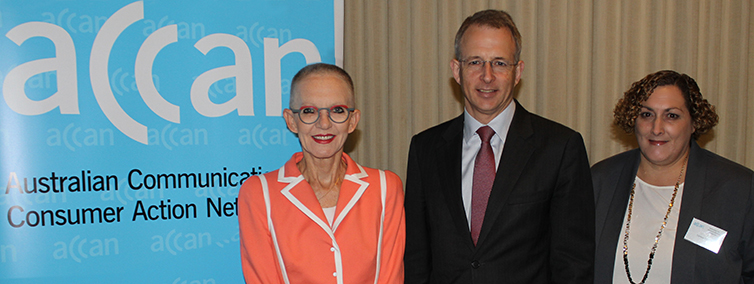
The Universal Service Obligation (USO) is a vital consumer protection in Australia. The USO ensures a standard telephone service (generally fixed line voice services) and pay phones are accessible to all people in Australia. It was formally introduced in 1991, but it has seen a number of changes over the years.

Sky Muster will also be used to deliver services in partnership with educational, community and healthcare service providers.
For example, educational services will be delivered in partnership with State and Territory Departments of Education. The process for connecting will differ depending on the body delivering the service.
My child receives distance education, what service will they receive and when?
Premises with geographically isolated children who receive distance education and are in Sky Muster designated areas, may be eligible to receive a second service to their premises which offers an additional 50GB per month per student (up to 150GB for 3 students - special arrangements may be made for sites with more than 3 students).
Your RSP will be able to verify the process required to place an application. Arrangements are on a state and territory basis.
There are currently four providers offering education services over Sky Muster. You can choose between two speed tiers (12/1Mbps and 25/5Mbps) and port options (all children's education through the same port or different ports).
Is this available for other education services, such as university?
No, educational services will only be available to distance education school children.
The Australian Communications Consumer Action Network (ACCAN) is Australia’s peak communications consumer organisation representing individuals, small businesses and not-for-profit groups as consumers of communications products and services. ACCAN focuses on goods and services encompassed by the converged areas of telecommunications, broadcasting, the internet and online services, including both current and emerging technologies.
We aim to empower consumers to make good choices about products and services. As a peak body, ACCAN will represent the views of its broad and diverse membership base to policy makers, government and industry to get a better outcome for all communications consumers. Member groups include community legal centres, disability advocates, indigenous organisations, financial counsellors, regional organisations, farmers’ federations, parents groups, seniors organisations and other individual members.
The operation of ACCAN is made possible by funding provided by the Commonwealth of Australia under section 593 of the Telecommunications Act 1997. This funding is recovered from charges on telecommunications carriers.
ACCAN administers a Grant Program as part of its funding agreement with the Commonwealth Department of Communications. The aims of the Program are to support consumer research and representation that is aligned with ACCAN’s strategic plan.
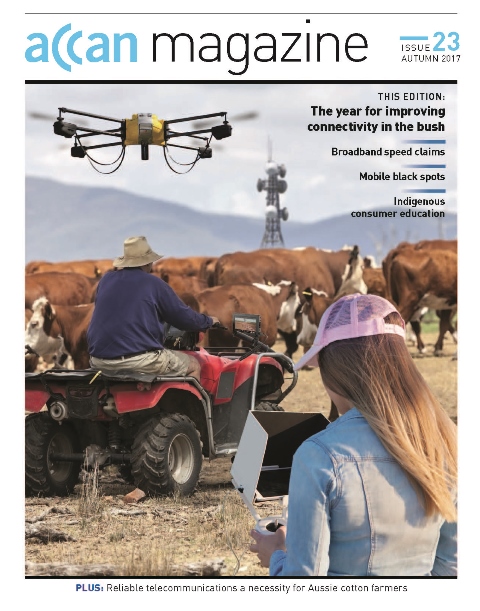
Download: ![]() ACCAN Magazine Issue 23 Autumn 20173.76 MB(Note: reading order not accessible)
ACCAN Magazine Issue 23 Autumn 20173.76 MB(Note: reading order not accessible)
Download accessible version:![]() ACCAN Magazine Issue 23 Autumn 2017 - accessible version38.93 KB
ACCAN Magazine Issue 23 Autumn 2017 - accessible version38.93 KB
Parts 7 and 8 of the Telecommunications Act ensure that broadband networks operate in a similar way, and to the benefit of consumers. They require network operators to offer services to any retail providers on request (offer open access on a non-discriminatory basis) and that they must be operated separate to the retail level (wholesale only). The ultimate aim is to ensure competitive networks exist that benefit consumer by increasing choice of retail providers.
Since 2012 Telstra has had an exemption from complying with these requirements in its South Brisbane Velocity network area. Other areas of Telstra’s fibre Velocity area are also exempt. These are scattered across the country, predominantly in areas of medium density population, including retirement villages, and greenfield developments (in Western Sydney, for example). These are areas populated with low income families, and older people on fixed incomes.
Read more: Telstra’s South Brisbane Velocity Network – time for change
ACCAN often hears stories from consumers spending hours waiting and trying to resolve problems with telcos (eg on the phone, in shops, or via chat windows). We know that all this time has a value to consumers but what is the cost?
A new report released from ACCAN provides advice on how to estimate the cost of consumer wait time.
University of Melbourne
This project is an extension of research funded by the Melbourne Social Equity Institute (MSEI), undertaking a survey and focus groups with the residents (representing 39 language groups) of Carlton Public Housing Estate in central Melbourne to analyse their strategies for coping with limited connectivity. The ACCAN grant will be used to conduct one-on-one interviews with 12 residents and provide interpreting services.






